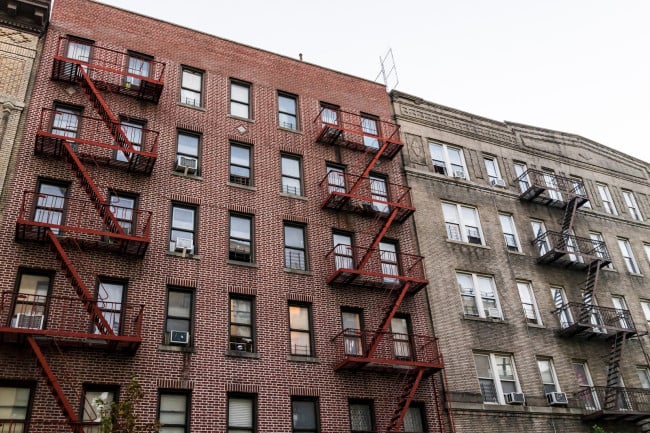How NYC's new landlord-tenant mediation program works

An eviction moratorium remains in place in NYC through October for tenants who are behind on their rent, but the city sees this new program as a way of potentially avoiding eviction proceedings altogether.
iStock
New York City renters experiencing issues with their landlords have a new avenue for settling those disagreements: In July, Mayor Bill de Blasio announced that the Mayor’s Office to Protect Tenants (MOPT) would partner with the city’s nonprofit Community Dispute Resolution Centers (CDRCs) to create a Landlord-Tenant Mediation Program, with the goal of solving apartment disputes without sending the parties involved straight to housing court. The program is free for tenants and landlords.
An eviction moratorium remains in place in New York City through October for tenants who are behind on their rent, but the city sees this new program as a way of potentially avoiding eviction proceedings altogether. “Right now the major focus of our work and our program is for those tenants that are behind on rent [who] could get to an agreement with the landlord,” says Ricardo Martínez Campos, the deputy director of MOPT.
While this partnership between the city and CDRCs is new, the mediation process itself is not: CDRCs like the New York Peace Institute (which works in Manhattan and Brooklyn) and the Institute for Mediation and Conflict Resolution (in the Bronx) have been helping New Yorkers resolve interpersonal conflicts for decades.
“The main focus of a CDRC is community cases, which are conflicts that are outside of the court system,” says Samantha Adler, a program manager at the New York Peace Institute. “These can be issues between neighbors and friends and family, and even landlords and tenants.”
Here’s what you need to know if you’re interested in using this program.
What types of issues is landlord-tenant mediation best for?
The collaboration came about in the wake of the coronavirus crisis, when many tenants have lost income and are having trouble paying their rent. “What we want to do is ultimately allow tenants that are behind on their rent to get some type of rent payment plans moving forward,” Martínez Campos says. “I think that mediation can help some of those tenants.”
It can also help if you’ve previously had a good relationship with your landlord. “It’s a restorative process,” Adler says. “The best cases for mediation are when there's already been a long-standing relationship of any kind, or if there's a valuable relationship to the parties that they want to preserve.”
Still, each situation is different, and mediation may not work for everyone.
“Maybe [a tenant] thinks that they could get to an agreement, but maybe what they actually need is to speak with a lawyer first,” Martínez Campos says. “Maybe they don't understand fully what type of situations they're facing. We help them understand that sometimes mediation is not for everyone and we connect them with free lawyers.”
How does the process work?
If you want to try mediation, the first thing to do is call 311 and ask to be connected to the city’s Tenant Helpline. You’ll be asked a series of questions to determine if you’re eligible for mediation; if so, the city will refer you to the CDRC that works within your borough, and that organization will take over from there. You and your landlord will be given a set time to meet (virtually, of course) and share your sides of the dispute, with a mediator guiding the process.
Each side will talk about their issues and feelings on the dispute, which lets the mediator open the door to conflict resolution.
Each side will get a chance to share their side of the story and the mediation will ask questions to find out more about the main issues, says Nick Schmitt, a program manager for the New York Peace Institute.
According to Schmitt, the mediator will help you and your landlord come up with options that might help resolve the dispute.
“If there are options that are generated that work for both parties — not just as something that they both liked, but something that both think would be doable — we'd help them write up an agreement, and they each sign the agreement,” he says. The agreement can also be reviewed by an outside party (like a lawyer) if need be.
The whole process typically takes a couple of weeks, including several sessions with a mediator.
Is mediation intended to replace housing court?
Not exactly—think of it as a first step if you’re having an issue with your landlord, but think there’s a chance that you could hash it out with the help of a mediator. “There's nothing lost by coming to mediation,” Schmitt says. “There's only the potential to gain something out of it, which is hopefully a long-lasting agreement and a better understanding of the other side.”
Adler also says that mediation can be useful if you anticipate that back rent may continue to be an issue in the future. “It looks forward in a way that housing court cannot,” she says. “When you go to housing court, maybe you could work out an agreement about rent arrears, but you might not be able to create a plan that also looks forward if you're still in the situation where you can't really meet your rent. Mediation gives that opportunity to also talk about what the future looks like in a way that court can't.”
How should tenants prepare for mediation?
While you wouldn’t need to bring all of the documentation that’s required for a case in housing court, Martínez Campos recommends having some basic things on hand, such as receipts of your previous payments to your landlord, and any documentation that shows your income (or lack thereof). If you’re not sure what documents would be useful, he recommends reaching out to the city’s tenant helpline (which you can access through 311) for guidance.
What happens if mediation does not work?
You may need to prepare to take your case to housing court once in-person cases resume. “If the landlord had wanted to file a case in housing court, they're still able to do that,” Schmitt says. “If the tenant had wanted to file a harassment claim against the landlord, they're still free to do that.”
The Mayor’s Office to Protect Tenants offers a spate of other resources for renters who may find themselves in housing court, including free legal assistance through the city’s Office of Civil Justice. MOPT also has a new tenant portal that takes renters through a series of questions about their specific issue, and then provides guidance on how to proceed, whether that’s compiling a record of your rent receipts, applying for a “one-shot deal” (a one-time subsidy that can help with rent payments), or answering an eviction notice.
“It's another way to help tenants better inform themselves and help them learn what they could be facing,” Martínez Campos says.


























